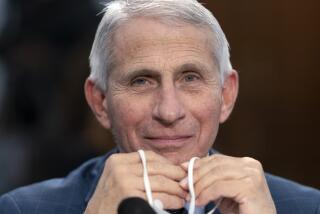A hawk on the wing
- Share via
It was supposed to be a blockbuster. But the production became a financial bust and, with critics denouncing their arrogance and self-delusions, the two stars have seen their romance fade. Associates are dishing to the media about whether a break-up is imminent or if they’ll manage to patch things up. No, this isn’t J. Lo and Ben Affleck but President Bush and Defense Secretary Donald H. Rumsfeld.
After he captivated the nation with his confident news conferences and seeming military wizardry, Rumsfeld’s star power has perceptibly dimmed in recent weeks.
He’s in the presidential doghouse for failing to anticipate the postwar mess in Iraq, while Secretary of State Colin L. Powell tries to persuade America’s friends and allies to send troops. Washington’s nastier susurrations would even have a disgruntled Bush firing Rumsfeld.
Midge Decter’s biography thus arrives at a timely moment. “Rumsfeld,” which was completed shortly after the Iraq war’s official end, offers a fine opportunity to assess the architect of the wars in Afghanistan and Iraq. Decter, a longtime neoconservative who co-chaired the hawkish Committee for the Free World with Rumsfeld in the 1980s, takes a wholly admiring view.
Tracing Rumsfeld’s rapid rise from insurgent congressman to two-time Defense secretary, she shows that he has for decades championed the preventive war strategy that Bush adopted after the Sept. 11 terrorist attacks.
Rumsfeld, born in Chicago on July 9, 1932, occupied a series of high-ranking positions at an unusually early age. Upon graduation from Princeton, he served as a Navy pilot from 1954 to ’57 before working as an aide on Capitol Hill. In 1962 he won a seat in Congress. He was 30. The Chicago Daily News announced: “Rumsfeld: New Star for GOP.”
Reelection followed three times. He created “Rumsfeld’s Raiders,” a young Turk movement in the House of Representatives that allowed him to push for election as minority leader a little-known Michigan lawmaker named Gerald R. Ford while supporting the passage of the 1968 civil rights bill and the Freedom of Information Act. Rumsfeld, Decter notes, had keen political antennae. Watergate, which derailed the careers of numerous GOP stalwarts, found him far away in Brussels, where he was ambassador to NATO. Once Ford succeeded Richard Nixon, Rumsfeld returned to Washington and became his chief of staff (the deputy was Dick Cheney) and, in 1975, secretary of Defense.
In the Ford White House, Rumsfeld’s great foe was Henry A. Kissinger, who deemed him “ruthless,” which constitutes anything but a disapproving verdict. The battle was simple. Kissinger wanted arms-control agreements with the Soviets. Rumsfeld didn’t. Touring the country in 1976, he stumped for greater defense outlays, flying a B-1 bomber to show it was airworthy and declaring that in times of peace there is a tendency “to become weak. And we know, historically, that weakness can be just as provocative as belligerence.” Sound familiar? For all the talk about the war on terrorism’s being fundamentally different from the Cold War, far less has changed than conventional wisdom would have it.
Once Jimmy Carter defeated Ford in 1976, Rumsfeld became a CEO at Searle Pharmaceutical Co., where he earned a fortune. But politics always beckoned: Rumsfeld took what turned out to be a fateful mission as Ronald Reagan’s special envoy to the Middle East in 1983. He visited almost every country in the region in 37 days, including Iraq. As Decter puts it, “Rumsfeld arrived in Baghdad -- the highest ranking U.S. official to visit that city in six years -- with a letter from Reagan to Saddam Hussein stating that Washington was preparing to resume diplomatic relations with him.” Rumsfeld also had another task: “To inform Amin Gemayel, the ill-starred leader of the once beautiful and soon to be godforsaken country of Lebanon, that the United States was pulling out the marines we had sent to Beirut,” Decter writes. In other words, Syria was going to be given carte blanche to control Lebanon. Rumsfeld wasn’t making policy; he was executing it. But his Middle East experiences left a deep impression on him. The lesson Rumsfeld drew -- and it is one that George W. Bush and Cheney have also repeatedly enunciated -- is that the Reagan and Bush the elder White Houses, not just Bill Clinton’s, were criminally lax in coddling terrorists rather than crushing them. It is this feeling of guilt, of the need to make amends for past sins, that has propelled the Bush war on terrorism. If deception existed in Bush’s rush to make the case for war, it stemmed not from a desire to mislead the American public about the true nature of the terrorist threat but from the conviction that Hussein and his ilk had been given a pass before and that the direct consequence was Sept. 11.
But does this conviction make Rumsfeld himself a neoconservative who wants to export democracy around the world? Decter does an excellent job of showing that Rumsfeld has never been a yes man and that the military loathes him largely for his perceptive insistence on transforming it into a modern force. But for all Rumsfeld’s zeal to go on the attack, it’s far from clear that he’s a member of the neoconservative camp. Rumsfeld has recently dismissed the need for the United States to do much in the way of reconstruction, arguing that it is a job for Iraqis. Rumsfeld’s comments suggest that he is a Fortress America conservative, more interested in nation destroying than in nation building, which is why he refused to send in enough troops for the occupation in the first place. The irony is that Bush is floundering in Iraq not because Rumsfeld wanted to go too far but because he didn’t go far enough.
More to Read
The biggest entertainment stories
Get our big stories about Hollywood, film, television, music, arts, culture and more right in your inbox as soon as they publish.
You may occasionally receive promotional content from the Los Angeles Times.










